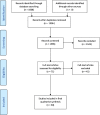Use of health economic evaluation in the implementation and improvement science fields-a systematic literature review
- PMID: 31307489
- PMCID: PMC6631608
- DOI: 10.1186/s13012-019-0901-7
Use of health economic evaluation in the implementation and improvement science fields-a systematic literature review
Abstract
Background: Economic evaluation can inform whether strategies designed to improve the quality of health care delivery and the uptake of evidence-based practices represent a cost-effective use of limited resources. We report a systematic review and critical appraisal of the application of health economic methods in improvement/implementation research.
Method: A systematic literature search identified 1668 papers across the Agris, Embase, Global Health, HMIC, PsycINFO, Social Policy and Practice, MEDLINE and EconLit databases between 2004 and 2016. Abstracts were screened in Rayyan database, and key data extracted into Microsoft Excel. Evidence was critically appraised using the Quality of Health Economic Studies (QHES) framework.
Results: Thirty studies were included-all health economic studies that included implementation or improvement as a part of the evaluation. Studies were conducted mostly in Europe (62%) or North America (23%) and were largely hospital-based (70%). The field was split between improvement (N = 16) and implementation (N = 14) studies. The most common intervention evaluated (43%) was staffing reconfiguration, specifically changing from physician-led to nurse-led care delivery. Most studies (N = 19) were ex-post economic evaluations carried out empirically-of those, 17 were cost effectiveness analyses. We found four cost utility analyses that used economic modelling rather than empirical methods. Two cost-consequence analyses were also found. Specific implementation costs considered included costs associated with staff training in new care delivery pathways, the impacts of new processes on patient and carer costs and the costs of developing new care processes/pathways. Over half (55%) of the included studies were rated 'good' on QHES. Study quality was boosted through inclusion of appropriate comparators and reporting of incremental analysis (where relevant); and diminished through use of post-hoc subgroup analysis, limited reporting of the handling of uncertainty and justification for choice of discount rates.
Conclusions: The quantity of published economic evaluations applied to the field of improvement and implementation research remains modest; however, quality is overall good. Implementation and improvement scientists should work closely with health economists to consider costs associated with improvement interventions and their associated implementation strategies. We offer a set of concrete recommendations to facilitate this endeavour.
Conflict of interest statement
Sevdalis is the Director of London Safety and Training Solutions Ltd., which provides quality and safety training and advisory services on a consultancy basis to healthcare organisation globally. The other authors have no interests to declare.
Figures
References
-
- Hoomans T, Evers SMAA, Ament AJHA, Hübben MWA, Van Der Weijden T, Grimshaw JM, et al. The methodological quality of economic evaluations of guideline implementation into clinical practice: a systematic review of empiric studies. Value Health. 2007;10(4):305–316. doi: 10.1111/j.1524-4733.2007.00175.x. - DOI - PubMed
Publication types
MeSH terms
Grants and funding
LinkOut - more resources
Full Text Sources
Medical



